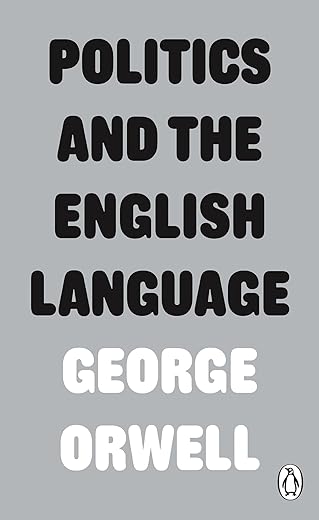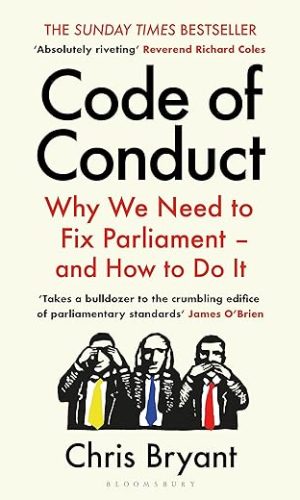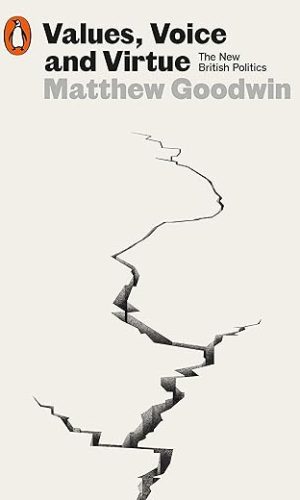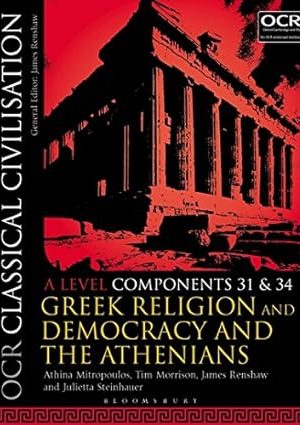Politics and the English Language (Penguin Modern Classics)
£2.80
‘Politics and the English Language’ is widely considered Orwell’s most important essay on style. Style, for Orwell, was never simply a question of aesthetics; it was always inextricably linked to politics and to truth.’All issues are political issues, and politics itself is a mass of lies, evasions, folly, hatred and schizophrenia.When the general atmosphere is bad, language must suffer.’Language is a political issue, and slovenly use of language and cliches make it easier for those in power to deliberately use misleading language to hide unpleasant political facts. Bad English, he believed, was a vehicle for oppressive ideology, and it is no accident that ‘Politics and the English Language’ was written after the close of World War II.
Read more
Additional information
| Publisher | 20th edition (3 Jan. 2013), Penguin Classics |
|---|---|
| Language | English |
| Paperback | 32 pages |
| ISBN-10 | 0141393068 |
| ISBN-13 | 978-0141393063 |
| Dimensions | 10.92 x 0.2 x 18.29 cm |










by Alan the Kaz
It’s difficult for me to review `Politics and the English Language’, because reading it has made me so much more aware of the pretentious follies of modern English writing that I’m scared to fall into the traps that Orwell discusses here. This pamphlet (and at 24 small pages, “pamphlet” is a more accurate noun to use than “book”) reprints George Orwell’s essay on writing. Less in depth than Strunk and White’s classic style guide, but quicker to the point and, frankly, far more enjoyable, I think this is as good as you’re going to get on the subject. While it was originally published in 1945, the vast majority of white Orwell writes is as relevant now as ever, if not more so, as ignorance is now the “order of the day” (a tired old term which Orwell, I’m sure, would have been none too pleased to have seen me use) in the mass media. Orwell sums up the situation surrounding the state of the English language thus:
“A man may take to drink because he feels himself to be a failure, and then fail all the more completely because he drinks. It is rather the same thing that is happening to the English language. It becomes ugly and inaccurate because our thoughts are foolish, but the slovenliness of our language makes it easier for us to have foolish thoughts.”
He continues, “Modern English, especially written English, is full of bad habits which can spread by imitation and which can be avoided if one is willing to take the necessary trouble.” The rest of the essay is Orwell’s lesson to us about what we shouldn’t do, more so than what we should do. He uses typical examples to illustrate how full of clichés and pretention English writing has become. The discerning reader who takes these matters to heart will find it difficult to read a newspaper article again without being critical of the language being used.
The political side of `Politics and the English Language’ becomes apparent later on, as Orwell quickly discusses how politicians of all colours and affiliations use these clichés and formulas to fool the public. But this is not a “political text”. Rather, it is an essay about the English language, and politics is but one aspect which permeates through it.
This edition of `Politics and the English Language’ also contains a short review Orwell wrote of `Mein Kampf’ in 1940. It’s not so much a review of the book as much as it is a discussion on his thoughts of Adolf Hitler, which is probably all the better. A fascinating insight and I’m glad it was thrown in at the back.
A great read, over all. If only more people would read this, we could be a lot more proud of our newspapers and other supposedly “respectable” publications. But, now that it’s finally in print again, and at only 99p and coming in at just over 20 pages, there isn’t really any excuse for anyone who cares about English to not read this. Reminds me of why I got into linguistics in the first place.
by Neutral
George Orwell is one of the few writers this reviewer has read extensively. His writing was always clear, thoughtful and has stood the test of time. ‘Politics and The English Language’ is one such essay. Orwell starts from the premise that the decline of the English language has been caused by political and economic factors. It has become ‘ugly and inaccurate because our thoughts are foolish’ while the slovenliness of our language has made it easier to have foolish thoughts in the first place. On has only to look at the intemperate language used by both sides in the Brexit debate and obnoxious response of the Democrats to the loss of the Presidential election to know that nothing has changed since Orwell wrote seventy years ago.
Orwell selects five passages as illustrations of various ‘mental vices from which we now suffer’. Amongst those are writings from Harold Laski, Lancelot Hogben, a communist pamphlet and a letter to Tribune the Left-Wing newspaper to which Orwell frequently contributed. Each one of them demonstrates a staleness of imagery, a lack of precision and are filled with hackneyed phrases, ‘tacked together like the sections of a prefabricated hen house’. The are filled with worn-out metaphors such as ‘no axe to grind’, ‘ring the changes’, ‘grist to the mill’ and ‘play into the hands of’. Many such metaphors suggest the writer is uninterested in what he is saying and often twist their original meaning as in ‘tow the line’ instead of ‘toe the line’.
He refers to operators or verbal false limbs such as ‘militate against’, ‘prove unacceptable’ and ‘have the effect of’ all of which have as their purpose the elimination of simple verbs. Newspaper editors use similar techniques as a means of maximising space, often substituting commas for conjunctions or prepositions. In the industrial world union leaders can be relied upon to condemn the latest ‘derisory offer before effecting a ‘satisfactory conclusion’’. Orwell deplores pretentious diction such as objective, element, basic, virtual and exploit which ‘are used to dress up simple statements and give an air of impartiality to biased judgements’. Adjectives such as ‘epoch-making’ ‘epic’ ‘historical’ – and more recently in soccer ‘scorpion’ – are used to dignify the ordinary with a status it does not deserve.
According to Orwell ‘Bad writers, and especially scientific, political and sociological writers, are nearly always haunted by the notion that Latin or Greek words are grander than Saxon ones’ and use unnecessary words such as expedite, ameliorate, predict, deracinated, in preference to Anglo-Saxon terms. He is particularly scathing of Marxist writing and its condemnatory tone which uses hyena, petty bourgeois, lackey, flunky and mad dog, terms that are still in use by liberals who call opponents fascist. He attacks meaningless words as used in art and literary criticism where romantic, plastic, human, values, natural and vitality are improperly used outside the pretentious context in which they are developed. In academic studies words carry deceitful meanings such as ‘fascism’ and ‘democracy’, the former signifying something undesirable, the latter something to be praised although Soviet democracy was an oxymoron and used in a consciously dishonest way. Other terms used in this manner are class, science, progressive, reactionary, totalitarian, bourgeois and equality.
Modern writing at its worst does not gum together long strips of words to clarify their meaning but to confuse readers. He points out that stating ‘I think’ is for more accurate than ‘In my opinion it is not an unjustifiable assumption that’. Orwell criticised stale metaphors, similes and idioms. Modern writers do not ask ‘What am I trying say?’ but ‘How can I confuse the reader?’ Political writing is particularly bad writing. Orthodoxy produces banality as in Blair’s ‘shoulder to shoulder’ with Bush over Iraq. Writing over a half a century earlier Orwell’s perception was accurate. ‘One often has a curious feeling that one is not watching a live human being but some kind of dummy: a feeling which suddenly becomes stronger at moments when the light catches the speaker’s spectacles and turns them into blank discs which seem to have no eyes behind them’ signifying a lack of perception of reality. In Orwell’s time political language consisted ‘largely of euphemism, question begging and sheer cloudy vagueness’ which he was able to express in Animal Farm, a manuscript which was turned down several times owing to the influence of the Ministry of Information.
In Orwell’s eyes the great enemy of clear language is insincerity. ‘All issues are political issues and politics itself is a mass of lies, evasions, folly, hatred and schizophrenia’. Orwell proposes half a dozen rules for good writing. The first is ‘Never use a metaphor, simile or other figure of speech which you are used to seeing in print’. Others included ‘never use a long word where a short one will do’ and ‘If it’s possible to cut a word out, do so’. The other three are ‘never use the passive where you can use the active’ or a foreign phrase, scientific word or jargon where there is an everyday English equivalent. Almost whimsically he states ‘Break any of these rulers sooner than say anything outright barbarous’. His contempt for political language is manifest and he consigns it all to the dustbin where it belongs.
The pamphlet also includes a review of the unexpurgated version of Hitler’s Mein Kampf about which wrote in March 1940. He suggests the book was edited from a pro-Hitler position with the intention of toning down its original ferocity and presenting the dictator in a favourable light. To offset any negative publicity the publishers included a note stating that all profits would be devoted to the Red Cross. Orwell was not impressed. He dismissed Hitler’s world-view as rigid and incapable of development. He acknowledges that in Germany at the time Hitler came to power his policies were appealing. Fascism and Nazism were closer to the reality of the human condition than western progressive thought. Two superb essays, four excellent stars.
by Jimmy Baginski
It’s amazing how much you can learn with 20 minutes of reading great writing. Conversely, Orwell explains the sneaky ways in which bloated and superfluous writing can manipulate the reader, leading you towards rationalizing immoral acts or justifying the most disastrous political policies in history. A glance at the history of the 20th century should be enough to illustrate his point. Orwell says here that the language we use is an extension of our thinking, and that the language we are programmed to use (or forbidden to) is an echo of the political influence that governs our reality. Shockingly, much of what this essay says is more prescient than ever, almost a century later. It brings about memories of some of the worst, most dense writing I was subjected to at university, full of it’s own pomposity, esoteric vagueness and intellectual posturing. Much of what passes for authoritative knowledge among the elites is nonsense dressed in the kind of complex emptiness Orwell describes here. The abiding lesson from this essay might be to be wary of charlatans hiding behind bogus linguistic structures that serve only to manipulate. He includes himself in this attentive call, and so should you. We are all subject to deception.
by Mark A. Hodgson
Brief and zen like sensibility- loved it. Use what you learned here the next time some purple haired peirced person prostrates themselves in front of your car calling you a nazi. The applications are however- endless